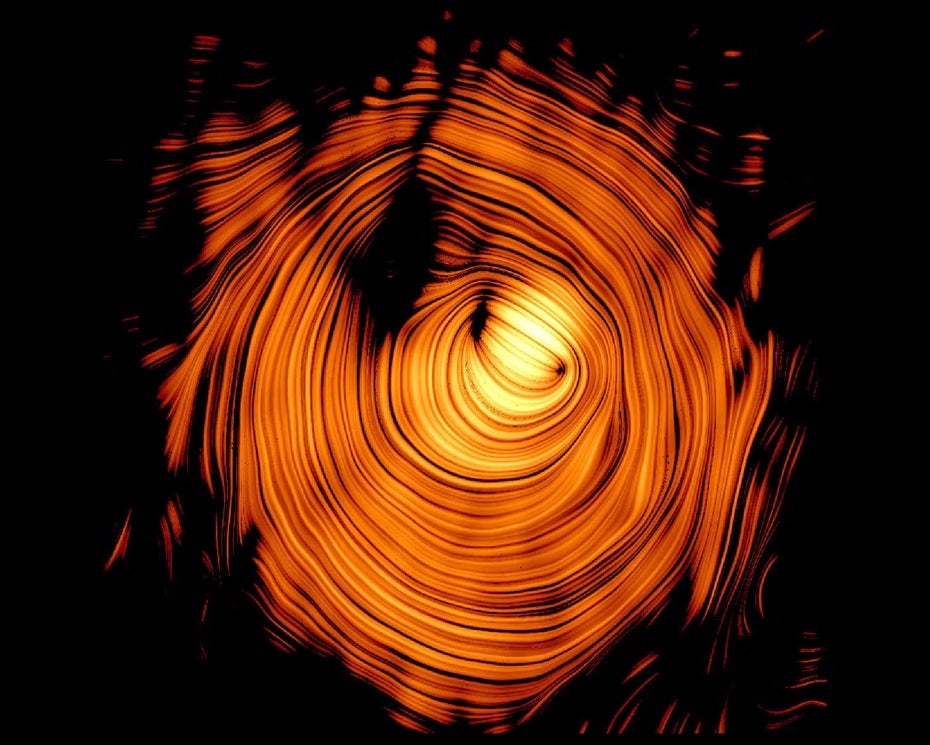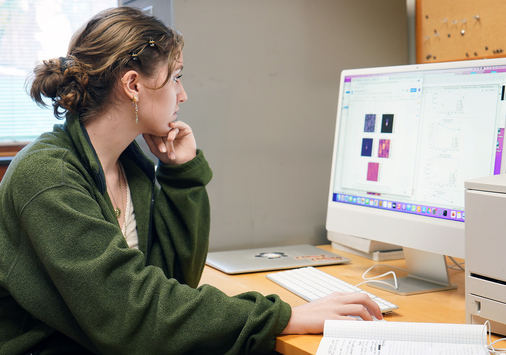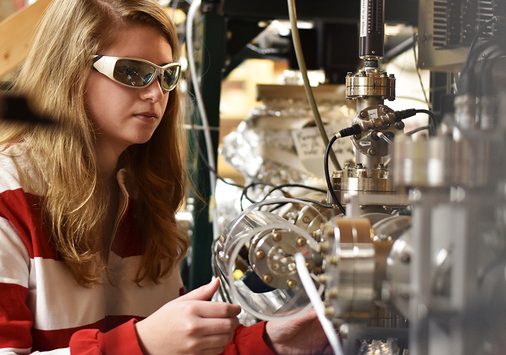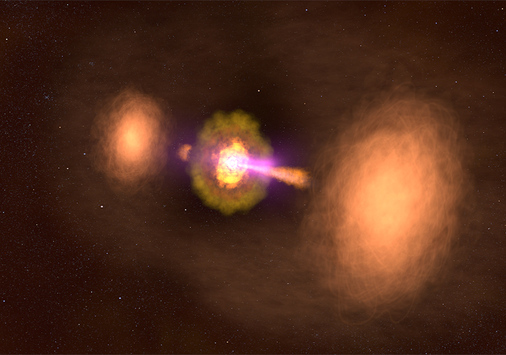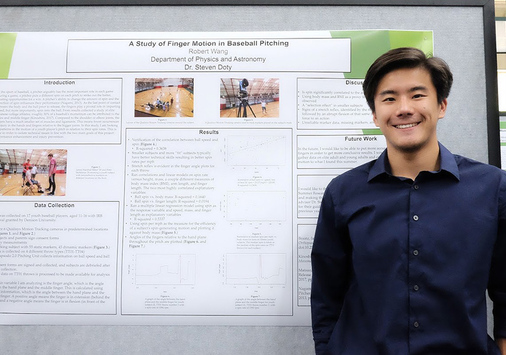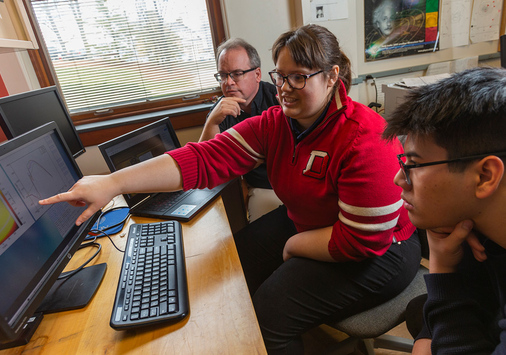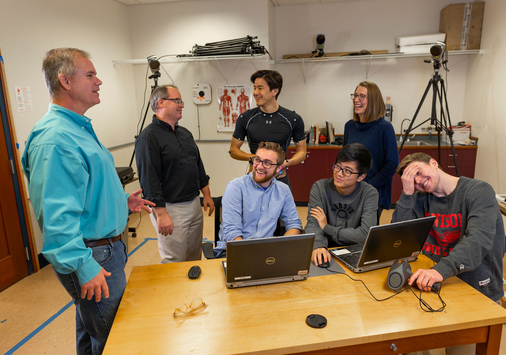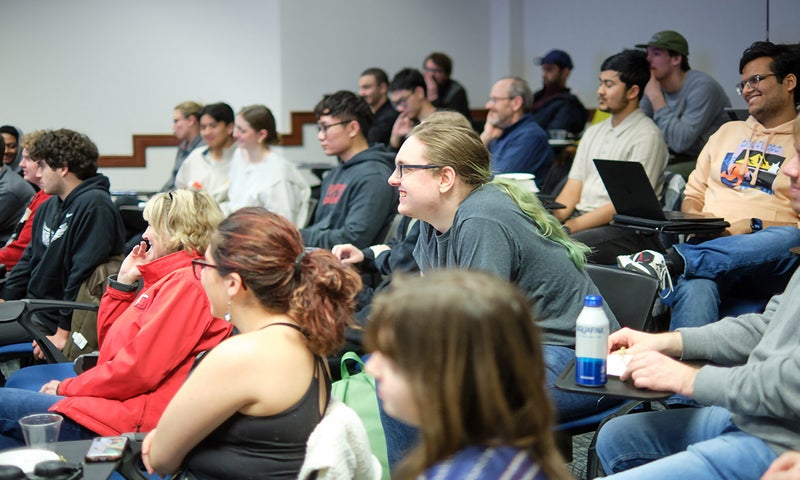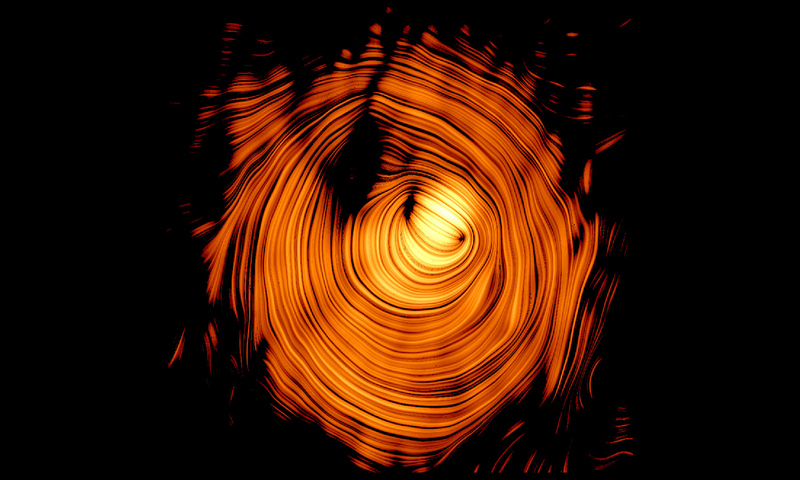Degree Requirements
Information presented from the 2025 - 2026 Academic Catalog.
Mission Statement
The Department of Physics & Astronomy at Denison University seeks to foster an understanding and deep appreciation of the physical world and our relationship to it. Our mission is centered on an engaging curriculum that balances breadth and depth, empowering students to explore, comprehend, and apply the fundamental principles of the universe.
Our faculty prioritize undergraduate education, combining effective teaching practices with the latest scholarly insights. We invite students to become active partners in the pursuit of original investigations, nurturing a culture of inquiry and discovery. Through our comprehensive program, students achieve increasing levels of autonomy in both experimental and theoretical physics.
The key objectives of our program are for students to:
- understand the principal laws which govern the physical world;
- master the fundamental reasoning process used in solving problems;
- learn mathematical techniques and computational tools to solve physics problems;
- develop an understanding of electronics, technical measurements, and data analysis;
- identify, organize, and conduct independent investigations and communicate the results.
Departmental Guidelines
The physics curriculum at Denison University begins with an exploration of modern physics and astronomy in the very first class, titled “Quarks to Cosmos” (Physics / Astronomy 125). In this course, students examine how time and space transform near the speed of light, the structure of atoms and nuclei, elementary particles, and the evolution of the universe. The following courses in the introductory sequence investigate motion, fluids, heat, electricity, magnetism, waves, and optics. Advanced courses dive deeper into classical mechanics, electrodynamics, quantum physics, and thermodynamics, as well as electronics and data analysis. Many of our students are also involved in research during their time at Denison, contributing to the generation of new knowledge.
A physics degree is a strong foundation for a wide range of careers, from engineering and medicine to finance and industrial management. Physics majors develop problem-solving, effective communication, quantitative reasoning, and technical skills that are highly valued by employers. They are also well-prepared for graduate study in physics, astronomy, and related fields.
All students interested in the physics major or in engineering should enroll in Physics 125 and calculus during the fall of their first year. Students can also complete a major in physics by beginning in the sophomore year, although they may have fewer course options. Students who have taken Physics 121 and Physics 122, and those that have transferred to Denison, should consult with the Department Chair about degree requirements.
Physics Major
The Department offers a Bachelor of Arts (B.A.) and a Bachelor of Science (B.S.) degree in Physics, as well as a minor in Physics and a minor in Astronomy. Both the B.A. and the B.S. are excellent preparation for a wide range of careers. The B.S. degree is highly recommended for students planning to pursue advanced study in Physics, Astronomy, or related fields.
The requirements for the B.A. and B.S. degrees in Physics, as well as the minor in Physics, are described below. Requirements for the B.A., B.S., and minor include courses in both Physics and Math; the B.S. also requires completion of an approved independent project. (Requirements for the minor in Astronomy appear under the Astronomy section of this catalog.) Students who have taken PHYS 121 - General Physics I and PHYS 122 - General Physics II should consult with the Department Chair about course requirements. All students interested in a major or minor in Physics, or a minor in Astronomy, should consult with a faculty member in the Department as soon as possible.
- Physics courses
- The B.A. degree requires:
Course List Code Title PHYS 125 Physics I: Quarks to Cosmos or ASTR 125 Physics I: Quarks to Cosmos PHYS 126 Physics II: Mechanics, Fluids, and Heat PHYS 127 Physics III: Electricity, Magnetism, Waves, and Optics PHYS 200 Modern Physics PHYS 201 Applied Mathematics for Physical Systems PHYS 305 Classical Mechanics PHYS 311 Electronics PHYS 312 Experimental Physics And two semesters of PHYS 400 (1 credit each), plus one additional Physics or Astronomy course at the 200-level or above. Any courses used to satisfy the upper-level elective requirement for the Physics major (B.A. or B.S.) or for the Physics minor may not also be used to satisfy the Astronomy minor. - The B.S. degree requires:
Course List Code Title PHYS 125 Physics I: Quarks to Cosmos or ASTR 125 Physics I: Quarks to Cosmos PHYS 126 Physics II: Mechanics, Fluids, and Heat PHYS 127 Physics III: Electricity, Magnetism, Waves, and Optics PHYS 200 Modern Physics PHYS 201 Applied Mathematics for Physical Systems PHYS 305 Classical Mechanics PHYS 311 Electronics PHYS 306 Electricity and Magnetism PHYS 312 Experimental Physics PHYS 330 Quantum Mechanics And two semesters of PHYS 400 (1 credit each), plus one additional Physics or Astronomy course at the 200-level or above. Any courses used to satisfy the upper-level elective requirement for the Physics major (B.A. or B.S.) or for the Physics minor may not also be used to satisfy the Astronomy minor.
- The B.A. degree requires:
- Math courses
- The B.A. degree requires MATH 135 - Single Variable Calculus and MATH 145 - Multivariable Calculus.
- The B.S. degree requires MATH 135 - Single Variable Calculus and MATH 145 - Multivariable Calculus, as well as one additional Math class (200-level or above) or a course in Computer Science.
- Independent project
The B.S. degree requires the successful completion of an independent project. The project must be approved in advance by the department.
Physics Minor
The requirements for a minor in Physics are:
| Code | Title | |
|---|---|---|
| PHYS 125 | Physics I: Quarks to Cosmos | |
| or ASTR 125 | Physics I: Quarks to Cosmos | |
| PHYS 126 | Physics II: Mechanics, Fluids, and Heat | |
| PHYS 127 | Physics III: Electricity, Magnetism, Waves, and Optics | |
| MATH 135 | Single Variable Calculus | |
| MATH 145 | Multivariable Calculus | |
Plus three Physics courses at the 200-level or above; at least one of these courses must include a significant laboratory component.
(Students who have taken PHYS 121 - General Physics I and PHYS 122 - General Physics II should consult with the Department Chair about requirements.)
Additional Points of Interest
Engineering
Denison offers the opportunity to study engineering via dual-degree programs undertaken in cooperation with leading schools of engineering. Students interested in these programs should consult early with the Pre-Engineering Director, Steven Doty. Additional details can be found in this catalog under Pre-Professional Programs.
